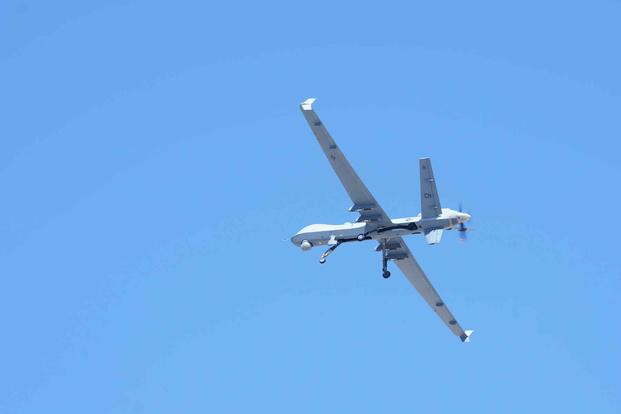An Air Force MQ-9 drone was forced to crash into the ocean due to a mechanical failure while flying over Africa last year, details in a new accident investigation report reveal.
The report, released this month, provides details on the May 4, 2023, incident "at an undisclosed location" somewhere within the U.S. Africa Command, or AFRICOM, area of responsibility. Those details come as the service grapples with a slew of drone mishaps and as the unmanned aircraft increasingly become a target for adversaries.
Nearly 10 hours into the MQ-9's flight, a "propulsion system anomaly" occurred, causing the pilot of the remotely controlled aircraft to shut off the engines and steer it to the water after being unable to fly to a recoverable location, according to the accident investigation board's findings.
Read Next: Marine Corps Creates Billet to Keep Dual-Military Families Together During Stressful Moves
"Recovery of the [aircraft] was not accomplished, inspection of the engine post-mishap was not possible," the report detailed.
The drone was from Creech Air Force Base in Nevada and piloted by an airman from the 184th Attack Squadron located at Ebbing Air National Guard Base near Fort Smith, Arkansas.
The loss of the MQ-9 cost the federal government $21,794,224, according to the report. News of the aircraft's crash in the AFRICOM region comes amid reports that the U.S. military will be reducing its presence in Chad and Niger, where it has conducted drone operations as part of a counterterror mission.
Details of the drone crash last year come amid other mishaps for the MQ-9.
The service had a total of 10 unmanned aircraft mishaps in fiscal 2023, according to an Air Force Safety Center spokesman. That marks a historic number of mishaps for the aircraft, which hasn't seen that many since fiscal 2015, according to public safety data.
It also comes as American drones become major targets amid rising global tensions.
As recently as Saturday, Houthi rebels in Yemen claimed to have shot down an American MQ-9 Reaper drone, The Associated Press reported.
In February, the Department of Defense confirmed an MQ-9 was downed off the coast of Houthi-controlled areas of Yemen in the Red Sea, adding "that it was shot down by a Houthi surface-to-air missile."
Another MQ-9 went down Jan. 18, and the Islamic Resistance in Iraq, a coalition of militias in that country, claimed to have shot it down, according to the Institute for the Study of War.
Last year, there were numerous incidents involving Russian aircraft and American unmanned drones leading to strong rebukes from U.S. officials.
In July 2023, two Air Force drones flying over Syria had unsafe encounters with Russian jets within a week of each other, which experts told Military.com was an indication of Russia's growing military weakness amid the ongoing war in Ukraine.
Russian fighter jets caused an Air Force MQ-9 drone to crash in international waters in March 2023 during an attempt to intercept the remotely operated aircraft over the Black Sea, Military.com reported.
Air Force Gen. James Hecker, commander of U.S. Air Forces in Europe and Air Forces Africa, said at that time that the incident resulted in a total loss of the MQ-9 aircraft and almost brought down the Russian jets.
"This unsafe and unprofessional act by the Russians nearly caused both aircraft to crash," Hecker said in a statement last year. "U.S. and allied aircraft will continue to operate in international airspace, and we call on the Russians to conduct themselves professionally and safely."
The MQ-9 has also seen other issues outside of conflict areas. Another accident investigation board report detailed that a civilian contractor was killed in September while doing testing on an MQ-9A drone.
Stephanie Cosme, 32, died on Sept. 7 after "she inadvertently walked into the parked remotely piloted aircraft's rotating propeller" during testing at Gray Butte Airfield near Edwards Air Force Base in California, Air Force Materiel Command said in a press release earlier this month.
The accident investigation board president said the test engineer was incorrectly taught how to take telemetry readings near the MQ-9A while the engine was running, and she also "lost situational awareness," the service said.
Related: 'Up-and-Comer' in Missile Defense Agency Died Following Air Force C-17 Testing Mishap











